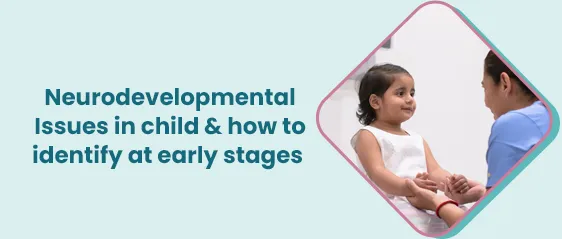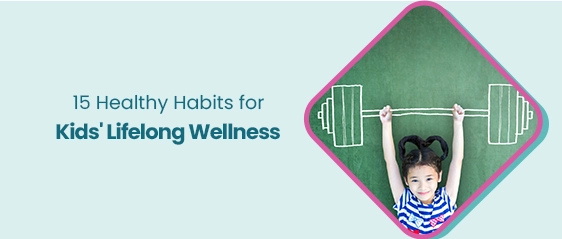How to Identify Neurodevelopmental Issues in Children?
- 16 Aug 2023
Neurodevelopmental issues refer to a range of conditions that affect a child's brain development, leading to difficulties in various aspects of their physical, cognitive, social, and emotional growth. These issues can significantly impact a child's ability to learn, communicate, and interact with the world around them. Identifying these issues early and seeking appropriate treatment is crucial for ensuring a child's optimal development and future well-being.
How to identify at an early stage :
There are several indicators and approaches to assist in identifying potential neurodevelopmental concerns in children during their early stages:
- Developmental Milestones: Familiarize yourself with typical developmental milestones for different age groups. These milestones encompass physical, cognitive, social, and language skills that children should achieve by certain ages. If a child consistently lags behind or regresses in meeting these milestones, it could be a sign of a neurodevelopmental issue.
- Observation: Regularly observe your child's behavior and interactions. Look for any patterns of difficulty or differences in comparison to other children of the same age.
- Communication Delays: Pay attention to your child's speech and language development. If your child has limited vocabulary, struggles with pronunciation, or has difficulty following instructions, it might indicate a communication disorder.
- Social Interaction: Observe how your child interacts with others, both adults and peers. If your child has difficulties making eye contact, understanding social cues, or forming friendships, it could signal a neurodevelopmental issue.
- Behavioral Patterns: Notice any unusual or consistent behavioral patterns. Extreme temper tantrums, repetitive behaviors, intense sensitivity to sensory stimuli, and difficulty with transitions can be indicators.
- Motor Skills: Monitor your child's motor skills development. Delays in fine motor skills (such as holding a pencil) or gross motor skills (such as walking) might suggest developmental coordination issues
- Attention and Concentration: If your child consistently struggles with staying focused, following instructions, and completing tasks, it could be a sign of attention-related issues like ADHD.
- Regression: Be alert to any regression in skills or behaviors. If a child starts losing previously acquired abilities, it's essential to investigate the underlying cause.
- Parental Instinct: Trust your instincts as a parent. If you have concerns about your child's development, don't hesitate to seek professional guidance.
- Professional Assessment: If you observe any of these signs or have concerns about your child's development, consult a medical professional. Pediatricians, developmental pediatricians, child psychologists, and speech-language pathologists are experts who can conduct comprehensive assessments to determine if there are any neurodevelopmental issues.
- Early Intervention Programs: Many communities offer early intervention programs for infants and toddlers who exhibit developmental delays. These programs provide assessments, therapies, and support services to address issues as early as possible.
treatment for neurodevelopment
The treatment for neurodevelopmental issues varies based on the specific condition, its severity, and the individual needs of the child. A comprehensive and multidisciplinary approach is often adopted to address these issues. Here are some common treatments and interventions used for neurodevelopmental issues:
- Behavioral Therapy: Behavioral interventions focus on addressing specific behaviors and teaching new skills. Applied Behavior Analysis (ABA) is a widely used approach that breaks down behaviors into smaller steps and uses positive reinforcement to promote desired behaviors and skills.
- Speech and Language Therapy: This type of therapy is essential for children with communication disorders. Speech-language pathologists work on improving speech articulation, language comprehension, expressive language skills, and social communication.
- Occupational Therapy: Occupational therapists help children develop fine and gross motor skills, improve sensory processing, and enhance their ability to perform daily activities independently.
- Physical Therapy: Physical therapists work with children to improve their mobility, balance, and coordination. This is particularly helpful for children with conditions like cerebral palsy or developmental coordination disorder.
- Educational Interventions: Specialized educational programs and Individualized Education Plans (IEPs) are designed to cater to the unique learning needs of children with neurodevelopmental issues. These programs aim to provide the necessary support and accommodations for academic success.
- Medication: In certain cases, medication might be prescribed to manage specific symptoms associated with neurodevelopmental issues. For example, stimulant medications are commonly used to manage symptoms of ADHD, while antipsychotic medications might be used for certain behavioral challenges associated with conditions like autism.
- Social Skills Training: Children with neurodevelopmental issues often struggle with social interactions. Social skills training helps them learn and practice appropriate social behaviors, communication, and understanding social cues.
- Parent and Caregiver Training: Educating parents and caregivers about the specific neurodevelopmental issue can empower them to provide effective support and strategies at home. This can include techniques for managing behaviors, promoting communication, and creating a structured environment.
- Early Intervention Programs: Early intervention services provide support to infants and toddlers who are at risk or show signs of developmental delays. These programs offer therapies, guidance to parents, and resources to enhance the child's development during critical early years.
- Counseling and Psychotherapy: Children with neurodevelopmental issues might experience emotional challenges. Counseling and psychotherapy can help them manage emotions, build self-esteem, and develop coping strategies.
- Assistive Technology: For children with communication difficulties, assistive technology tools such as communication devices and apps can facilitate communication and interaction.
- Alternative and Complementary Therapies: Some families explore complementary therapies like music therapy, art therapy, and sensory integration therapy as additional means to support a child's development and well-being.
Consulting the Right Doctor at Right Time:
If you suspect your child may have a neurodevelopmental issue, it's crucial to consult a specialized healthcare professional. A neurologists, child psychologists, or speech therapists, depending on the specific concerns.
Frequently Asked Questions
1. How can I identify if my child has a neurodevelopmental issue?
Early signs may include delays in reaching milestones, difficulty with speech or motor skills, struggles in social interactions, and unusual behaviors. If you have concerns, consulting a doctor or specialist can help identify potential issues.
2. What professionals can help treat neurodevelopmental issues?
Developmental pediatricians, child psychologists, speech-language pathologists, occupational therapists, and pediatric neurologists are experts who can assess, diagnose, and provide appropriate treatments for neurodevelopmental issues.
3. What are some common treatments for neurodevelopmental issues?
Treatments vary but can include therapies like speech therapy, occupational therapy, behavioral therapy, and educational interventions. Medications might be prescribed for certain conditions. Early intervention and support from parents and caregivers are also vital.
4. Can neurodevelopmental issues improve with treatment?
Yes, many children show significant improvement with early and appropriate interventions. Treatment plans are designed to help children develop essential skills and abilities, improving their overall quality of life and future prospects.
5. What role do parents play in the treatment process?
Parents play a crucial role in supporting their child's treatment. They can provide consistency, follow through with therapies and interventions, and create a supportive environment at home. Collaborating with healthcare professionals helps ensure the child's success in overcoming challenges.





